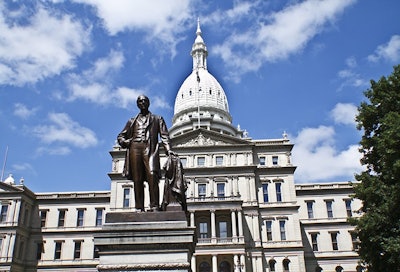
It was a major headline in the U.S. cannabis industry on March 15: The state of Michigan shut down 40 marijuana businesses, and regulatory officials planned to close “hundreds more” in the days ahead. By March 22, officials confirmed that at least 200 businesses had been issued the letter.
The state is targeting “establishments that stayed open past the Feb. 15 deadline in which you needed to have turned in an application to the state of Michigan,” according to David Harns, spokesperson for Michigan’s Department of Licensing and Regulatory Affairs (LARA). Harns’ office is not disclosing which businesses received this letter; Cannabis Dispensary has filed a FOIA request for the names of businesses issued a cease-and-desist. (We expect to hear back by April 10.)
Harns confirms: “We anticipate ending up in the hundreds [of businesses] when it’s all said and done.”
See a copy of the cease-and-desist letter here.
Michigan LARA cease-and-desist letter for marijuana businesses, March 2018 by sandydocs on Scribd
Businesses that applied for state licensure can operate on a temporary basis if they have local authorization to do so. The Medical Marijuana Licensing Board planned to discuss license applicants and the cease-and-desist actions during a March 22 meeting. Actual dispensary licenses are expected to be awarded in April.
The state clampdown comes after years of inconsistent oversight of medical marijuana cultivation and distribution in Michigan.
In 2008, the Michigan Medical Marijuana Initiative was approved by a 63-37 margin statewide. The initiative allowed qualified patients and caregivers to grow marijuana for personal possession and use. Matthew Abel, executive director of Michigan NORML and an attorney at Cannabis Counsel, P.L.C., says that the initiative language was written in such a way that a court could have ruled to allow legal retail sales at permitted dispensaries in Michigan, but that order never came.
“By 2013, it was pretty clear that there was no commercial framework,” Abel says.
Home-grow proliferated in the state until 2016, when the legislature passed the Medical Marihuana Facilities Licensing Act (note the spelling, unique to Michigan state policy). That law created a legal structure to regulate a formal medical marijuana marketplace. In December 2017, the state began accepting license applications from growers, manufacturers, distributors and retailers.
Michigan has not set a cap on the number of licenses it will issue, although local municipalities may set their own caps if they so choose.
Abel also serves on the board of directors of MI Legalize, which is pursuing a ballot initiative to “regulate marijuana like alcohol.” The group submitted 362,102 signatures to the Secretary of State.
“The opportunity to challenge the signatures has passed, so unless there’s some other legal challenge we’re likely to have that [on the November ballot],” Abel says.
The MI Legalize campaign’s ballot issue would create a “state-regulated system of licensed marijuana businesses that will cultivate, process, test, and sell marijuana and marijuana-infused products to adults 21 and older. [The] proposal also enacts an excise tax on marijuana at the retail level in addition to the standard state sales tax.”
If voters approve the measure, Michigan would be the first state in the Midwest and the Great Lakes region to legalize adult-use cannabis. However, considering Michigan's polarized electoral districts, it remains to be seen how municipalities across the state embrace the issue—to say nothing of the impending medical marijuana market.
“It’s a good opportunity now for municipalities to do some economic development,” Abel says. “But we have a very conservative legislature, so they’ve had to have been dragged kicking and screaming, really, to bring forward a regulated market. … We’ve had a lot of pushback for years in the implementation of the Michigan Medical Marijuana Act. As highly regulated as it is, I’m pleased we’re finally at least at this point.”
The state offers five license categories: cultivation, processing, testing, secure transport and retail (dispensary ownership). A $6,000 application fee is due with the 48-page application. From there, specific license types come with their own equity requirements ($300,000, with a quarter of that on-hand in liquid cash, for a 1,000-plant cultivation license, for instance).
Vertical integration is allowed for businesses that wish to go that route, but the transportation of product between a cultivation facility a dispensary must be handled by a licensed third party.
“It’s unfortunate that there’s this secure transport license required that in my view adds a level of bureaucracy and expense that otherwise wouldn’t be necessary,” Abel says. “But it is what it is, and the legalization proposal will change that.” Secure transport and testing lab licenses cannot be paired with any other license, such as cultivation, processing or retail. (Abel notes that business operators may, however, hold cultivation, processing and retail licenses simultaneously under the current framework.)
This week, LARA published a list of more than 70 communities in Michigan that had passed ordinances to allow medical marijuana businesses to operate under the 2016 law.
“I think what it’s going to do is develop enclaves of friendly territories where a smart community will allow dispensaries in a neighborhood they want to be redeveloped,” Abel says.
Among licensed marijuana businesses, Ann Arbor is a particularly active jurisdiction. The city boasts 13 temporary dispensary licenses as of the Feb. 15 application deadline, mostly clustered along main streets near the University of Michigan.
"I'm very optimistic that this industry is going to result in a lot of good new jobs and tax revenue, and most importantly, services to patients," Council Member Anne Bannister told mlive.com in December. "I think through the hospital and the medical advances that are being done, doors are opening for a lot of patients to receive better care through this industry, and I think Ann Arbor is wise to open up and welcome these groups with the 600 feet [required between each permitted dispensary location]."
In Lansing, the state capital, zero medical marijuana businesses have been granted a local permit. (The city has denied 18 applications.)
According to Cannabiz Media, 169 medical marijuana businesses statewide applied for a license by the Feb. 15 deadline. As far as the businesses that received cease-and-desist letters, they’re still allowed to pursue the formal license application process in Michigan. “Those businesses that stayed open and did not apply by Feb. 15: That will be looked at as an impediment to their licensure,” Harns says. “It’s not an automatic disqualifier, but it is a negative point on their application.”
Top photo courtesy of Adobe Stock


























